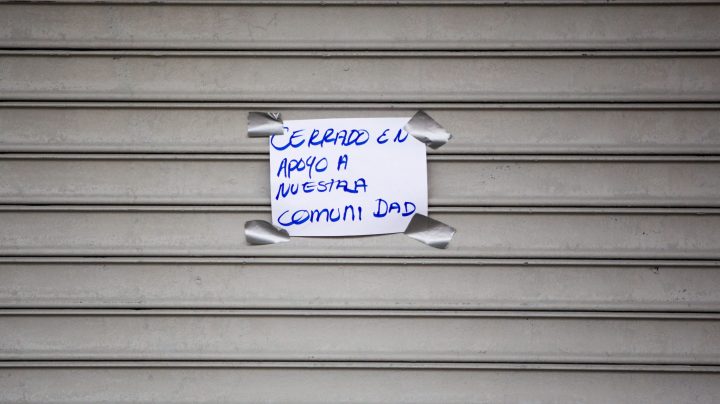New Research Shows Latinos Have Highest Unemployment Rate for First Time on Record

A business is closed as Latino immigrants across Philadelphia skip work on Thursday as part of a "Day Without Immigrants" campaign on February 16, 2017 in Philadelphia, Pennsylvania. Photo by Jessica Kourkounis/Getty Images
In May, the United States’ unemployment rate soared to levels unprecedented since the Great Depression—a result of businesses shutting down to contain the spread of the coronavirus. While this has had mass implications across the country, new research from the Urban Institute shows that Latinx workers are the ethnic group most affected by job losses.
In a recent post that analyzed data from the Bureau of Labor Statistics (BLS) and pulled insights from an Urban Institute survey conducted in March and in April, researchers found several explanations for why Latinx workers have felt the impact of unemployment so heavily. According to the Health Reform Monitoring Survey, only a quarter of Latinx workers say they can do their jobs, even partially, from home, which creates myriad challenges as states implement and enforce stay-at-home orders.
Additionally, BLS data revealed that Latinx workers are overrepresented within the leisure and hospitality industry, where they make up about 27% of the workforce. Leisure and hospitality was dealt a blow during the pandemic; it saw about 37% of all job losses in April and accounted for half of Latinx unemployment increases. But Latinx workers also form large parts of other industries that have been struggling during the pandemic, among them construction and repair/maintenance services sectors.
So why exactly have Latinx workers, in particular, been so hard-hit? Researcher Natalie Spievack explains part of it is the result of structural barriers to opportunity and the circumstances of Latin American immigrants.

“Latinx people are more likely than white people to live in places with limited access to high-quality education and jobs and face persistently high levels of hiring discrimination in the job market,” she tells Remezcla. “Additionally, foreign-born Latinx workers, who often move to the US in pursuit of better economic opportunities, have lower levels of educational attainment than native Latinx workers and other racial and ethnic groups.”
The Urban Institute’s research provides a better look at what Latinx workers are up against, but there are still gaps in knowledge. Researcher Jorge González shares that while some BLS data and surveys use undocumented individuals in their samples, we don’t have specific numbers about undocumented workers in particular, who make up a sizable portion of the Latinx community. Additionally, he notes that some Latinx workers who do still have jobs fall under “essential” categories that might not be getting the right safety protections during the pandemic. There’s also a need to focus more on other job strains, including cuts to pay hours, which the Urban Institute’s Health Reform Monitoring Survey found many families of color are experiencing.
“A fuller picture of how Latinxs are affected needs to consider the ‘double-edged sword’ they face amid the COVID-19 crisis—on one side there is an overrepresentation in the industries most likely to experience furloughs,” he said. “On the other, Latinx workers make up a big part of the workforce in various ‘essential’ industries like meat processing, farm work, and construction. Many [have a] lack of proper safety measures for [their] workers, thus increasing their risk of exposure to the virus. This issue is likely more pronounced for undocumented workers who are more vulnerable to inappropriate work conditions.”

The Urban Institute outlines several ways to ease the burden of unemployment, urging more access to unemployment insurance, refining the Paycheck Protection Program, extending benefits and health insurance and offering training for new jobs.
“There will likely be a need for a new iteration of the CARES Act,” González said, referencing the relief package passed in Congress to provide American workers and small businesses economic assistance. “House Democrats recently introduced a bill that would include $1 trillion to state and local governments to avert layoffs and $200 billion in hazard pay for essential workers. $1 billion could be channeled towards community development banks, which are well-positioned to support the financial needs of low-income communities. The Paycheck Protection Program will also require some reforms so it reaches minority-owned small businesses and those in low-income communities.”